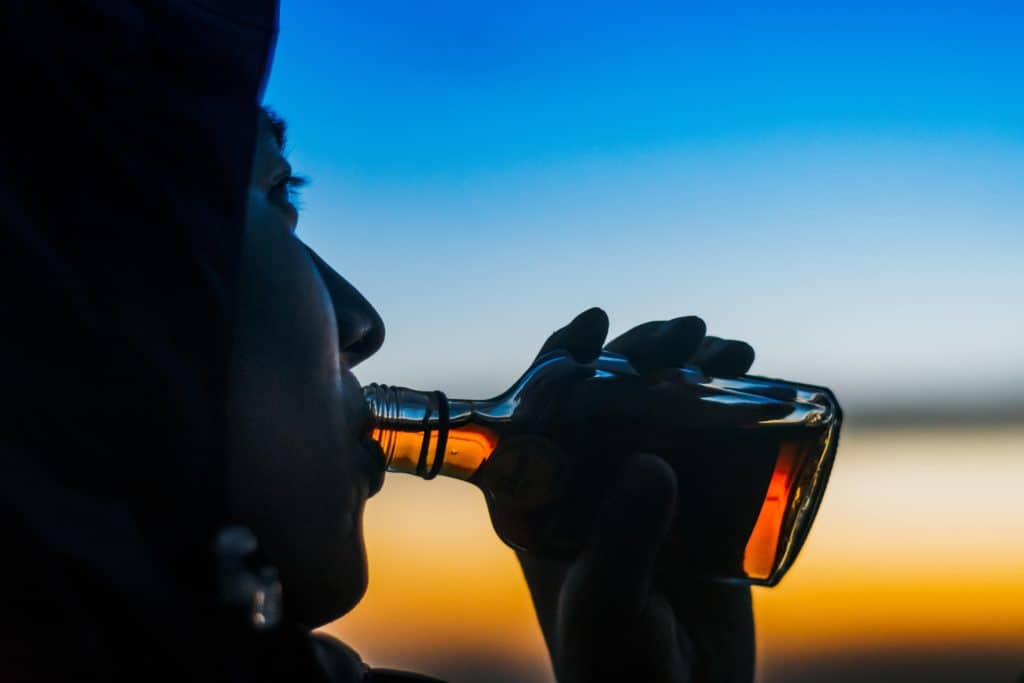Drinking alcohol in moderation is not typically considered harmful to one’s health. Drinking alcohol frequently and in large quantities is what leads to harmful side effects. Binge drinking, specifically, is one of the most common and dangerous examples of excessive alcohol use.
The Centers for Disease Control and Prevention’s binge drinking definition is: “a pattern of drinking that brings a person’s blood alcohol concentration to .08 grams percent or above.” This is approximately equivalent to five or more alcoholic drinks for men or four or more alcoholic drinks for women in about two hours. Drinking this much alcohol in a shorter span of time doesn’t allow the body to metabolize it at a safe rate.
People who binge drink become intoxicated more quickly and may have a more intense reaction to side effects of dizziness, slurred speech, delayed reaction times, and memory loss. Both the amount and frequency play a part in how alcohol affects the body and leads to behaviors of alcohol abuse. Even if a person binge drinks infrequently, each time it occurs, it puts that person’s health at risk.
Who’s Affected Most by Binge Drinking?
Binge drinking is most prevalent among adults ages 18 to 34. It’s popular among college students who are experiencing alcohol use for the first time and are in an environment where social drinking is the norm. The more binge drinking they do, the higher tolerance they build, which means they require more alcohol before they feel buzzed or intoxicated.
Additionally, data shows that one in every six U.S. adults binge drinks four times a month and consume approximately seven drinks per binge. Men are twice as likely to participate in binge drinking than women and is a regular occurrence among those who already drink excessively. Even though it happens more frequently among a younger demographic, binge drinking still occurs at a rate of nearly 20% in people ages 35 to 44.
Times of high stress often leads to increased drinking and peer pressure at a young age is one of the driving factors of actions like binge drinking. Each time you drink to excess, it puts your physical and mental health at risk.
Dangers of Binge Drinking
Drinking to excess is harmful to the person who’s consuming alcohol, but it’s also dangerous for anyone else that comes into contact with them. Binge drinking leads to behavioral changes that are not indicative of being in control. Physically, a person who’s intoxicated has a slower reaction time, experiences memory loss, and suffers from other delayed cognitive functions. As a result, binge drinking often leads to motor vehicle accidents and injuries. Millions of people are reported driving under the influence every year, putting themselves and those that share the road with them in danger. Over a quarter of all traffic-related deaths are the result of alcohol-impaired crashes.
Binge drinking can also lead to other kinds of incidents like increased violence and alcohol poisoning. Many people who binge drink also experience short-term memory loss or blackouts where they can’t track their actions. Plus, any type of excessive drinking continually does irreversible damage to the body, specifically the brain, heart, and liver. It wreaks havoc on the body and has lingering negative effects.
Alcohol poisoning is also a regular occurrence among binge drinkers or individuals with alcohol use disorder. Binge drinking can affect your heart rate, body temperature, and breathing. It can also cause vomiting (and subsequent choking if unconscious)and seizures, all of which can become fatal.
Binge Drinking Can Lead to Alcohol Addiction
Binge drinking defined in the simplest terms is “drinking too much, too fast.” It can create a regular occurrence of alcohol abuse that eventually leads to addiction. Since binge drinking often occurs in social settings and doesn’t normally happen night after night, the link to alcoholism doesn’t seem as apparent. However, any time a person drinks to excess, it changes the makeup of their brain.
First, a person’s tolerance is increased to a point where they drink more to feel intoxicated. As the brain begins to adapt, it feels normal to function with alcohol in the body rather than without it. This dependency quickly turns into addiction once the body starts going through withdrawal symptoms when the person stops drinking.
Once a drinking behavior reaches the addiction stage, there’s no longer control. Alcohol addiction is when you’re unable to stop drinking even if you want to. Alcoholism is a disease that’s harmful to so many. Without immediate alcohol treatment and care, alcoholism can eventually result in irreversible damage to parts of the body and cause it to shut down.
Abstinence from alcohol is the best way to fight against binge drinking. Some people are able to drink in moderation without feeling the need for excessiveness, while others are more susceptible to binge drinking or alcohol abuse. The only way to prevent this tendency toward alcohol dependency is to eliminate it altogether.
Signs of Alcoholism
Alcohol use disorder is a disease that results from alcohol dependency and compulsive behavior. When addiction takes over the body, it depends on alcohol to feel normal even as it’s doing harm. Withdrawal symptoms often occur within several hours after the person’s had their last drink and can last for days at a time with increased intensity. Due to the pain that these symptoms cause, it’s not abnormal for a person to continue drinking to alleviate them. The result is a cycle of addiction that’s tough to break free from on your own.
It can often be self-diagnosed and won’t look the same for everyone who experiences it. The perception of alcoholism ranges from the actions of a functional alcoholic to the extreme of a person who’s constantly stumbling around and slurring their words. While both of these personas exist, each situation has more complexities than these generalizations.
Continuous binge drinking can also fall into the category of alcoholism. Withdrawal symptoms are the key signs that the body now relies on alcohol in order to feel at a state of equilibrium. When not drinking, how does the body react? Regular withdrawal symptoms include:
- Nausea and/or vomiting
- Severe headaches
- Increased blood pressure and/or heart palpitations
- Tremors
- Memory loss
- Heightened anxiety
- Insomnia
A second major sign of alcoholism is if it’s affected your life negatively in any way. Consider if your drinking has led to problems at work, at home, or among your friends and family. Do you often hide how much and how often you drink? Have you been unable to fulfill certain obligations due to the effects of drinking alcohol excessively? These are a few of the ways that indicate a drinking pattern that has morphed into addiction. When you are unable to stop drinking despite wanting to do so, you have developed alcoholism.
You don’t have to reach the point of alcoholism to seek treatment and care. There are several resources and support groups that can give you the tools you need and guide you through your problems with drinking. By creating a positive environment and learning ways to handle temptations and redirect your attention to healthier choices, it gives you a sense of control over your decisions.
Drinking Doesn’t Have to Define You
Millions of people experience excessive drinking behavior at some point during their lifetime. Different ages and environmental factors affect how much or how often a person drinks. Now that the question of “what is binge drinking” has been defined, you can steer clear of this and other warning signs that make up excessive drinking behavior.
If you have reached the addiction stage, the goal is to take back control of your life through detox. Detox is the process of ridding your body of alcohol and abstaining from future use. The feeling of alcohol withdrawal symptoms is uncomfortable and painful and can cause you to want to drink more. It’s safer and more successful to go through this process with the assistance of others.
The compassionate help and resources available through receiving aid from a detox center serves as the solid foundation you need to power through this intense phase of your recovery. There are therapists and other trained professionals who have the proper knowledge, training, and often, can pull from their own personal experiences to support what you’re going through.
After detox, you along with your dedicated care team will decide the best route of care. Residential treatment is recommended to give you a place and opportunity to fully concentrate on your recovery without any outside influences. It allows you to work your way back to a healthy routine where the focus is on your physical and mental well-being. Going through detox and treatment is a way to learn from your experience and identify changes to make in the future.
Binge drinking is often a catalyst that leads to more destructive drinking patterns. By accepting the help that’s available, you can begin to understand more fully why you drink, how it’s harmful in the short-term and long-term, and ways to handle it going forward. Each person has their own unique relationship with alcohol. Rather than labeling the good from the bad, detox and treatment is about understanding what your body and mind need to feel at peace in a healthy, alcohol-free way.
Don’t let the effects of binge drinking take over you. If you are currently suffering from a substance abuse problem, our professional team can help. Our staff members will help reduce the health risks and symptoms associated with detoxification so you can get sober as soon as possible. If you’re ready to regain your health and well-being, call our detox team today.
Sources:
- “Alcohol Poisoning.” Mayo Clinic, Mayo Foundation for Medical Education and Research, 19 Jan. 2018, www.mayoclinic.org/diseases-conditions/alcohol-poisoning/symptoms-causes/syc-20354386.
Author
-

President, CEO & Founder at Northbound Treatment Network
Paul Alexander is the CEO, President & Founder of Northbound Treatment Network in Newport Beach, California. He believes wholeheartedly in transformational leadership, organizational health and effective, fully integrated substance use disorder and mental health treatment. With over 27 years of experience in behavioral healthcare, Paul has extensive knowledge of “in vivo” treatment modalities, clinical development, operations, strategy, marketing and financial planning. He has been widely recognized for his development of collegiate-based residential treatment programs for students in recovery and authored a research study at The University of California confirming this modality’s effectiveness.
Paul’s comprehensive professional experience, willingness to innovate, and emphasis on organizational health are vital factors in Northbound’s continued success. Paul received his Certified Addiction Treatment Specialist training at Saddleback College in Mission Viejo, CA, and was awarded Outstanding Alumni Service Award in 2002. Paul holds a Bachelor of Arts degree in Criminology, Law and Society, Summa Cum Laude, from University of California, Irvine, and a Juris Doctorate degree from Loyola Law School of Los Angeles. Paul currently serves on The National Association of Addiction Treatment Providers (NAATP) board. In addition, he serves on The Family Recovery Foundation board and The CarePossible board in Orange County; both organizations are committed to raising funds for family recovery and treatment for former military personnel. Paul is in recovery himself and lives in Orange County with his wife Silvana and his two young sons, Noah and Dean.







